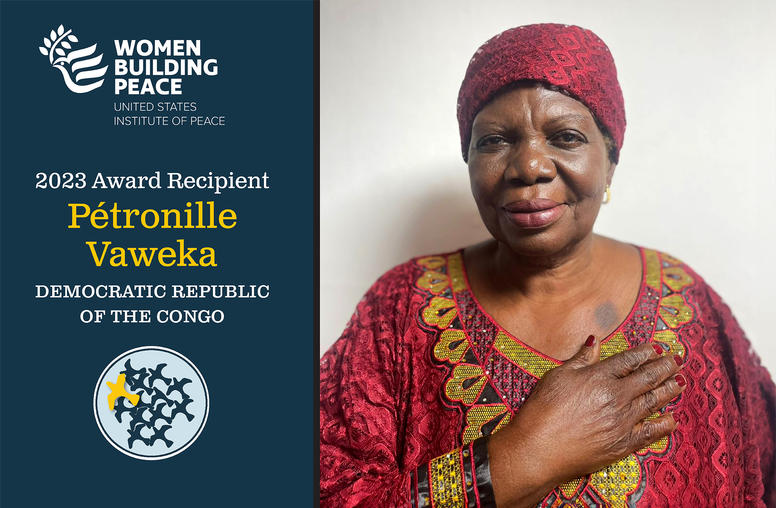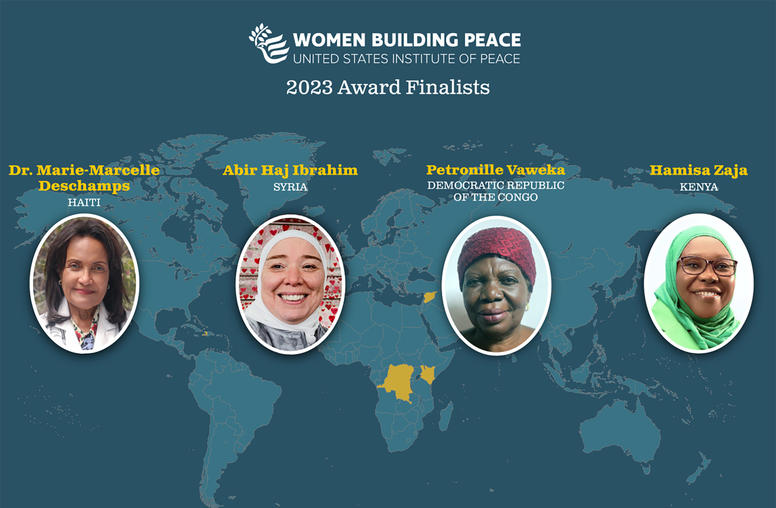Senior Fellows Welcomed at U.S. Institute of Peace
Institute announces 2001-2002 Senior Fellows.
WASHINGTON, D.C. -- The United States Institute of Peace is pleased to welcome its 2001-02 Senior Fellows. This is the fifteenth class of fellows to be in residence at the Institute. The Jennings Randolph Fellowship Program is one of the Institute's core programs. Named in honor of former U.S. Senator Jennings Randolph of West Virginia, a vigorous proponent in the Institute's founding, the Fellowship Program allows leading policy practitioners and researchers alike the opportunity to examine issues of major concern to international conflict and peace.
In welcoming the new cohort, Fellowship Program Director Joseph Klaits noted, "The contributions of some 200 Senior Fellows over the years to the Institute's work have been invaluable. Their integration with the Institute's ongoing work has profoundly enhanced our own research, education, and training programs. Alumni from the Jennings Randolph Fellowship Program can be found working on the front-lines in the prevention, management, and resolution of international conflicts around the globe."
In addition to addressing their special projects, fellows participate in the Institute's public outreach efforts by briefing the media, Congress, policymakers, and the public on international issues. Books and reports resulting from fellowships are published by the U.S. Institute of Peace and available both in print and on the Institute's web site.
Senior Fellows are selected by the Institute's board of directors following an international competition. The submission deadline for the Senior Fellow Program is September 15 of every year. Awards are announced the following April. A full listing of former fellows along with their project topics and application material can be found online at www.usip.org.
2001-02 Senior Fellows (Listed with Special Project Focus)
Prof. Jacob Bercovitch, Lecturer in Political Science, University of Canterbury, New Zealand
"Evaluating Mediation in Protracted Conflict" (February - September 2002)
Dr. Charles T. Call, Watson Institute, Brown University
"Constructing Justice and Security after War"
(Guest Scholar - From October 2001)
Dr. Ruth Firer, Director of Peace Education Projects, Hebrew University of Jerusalem;
"To Learn to Live Together: an Israeli-Palestinian Educational Joint Project" (Oct. - Dec. 2001)
Dr. Richard Joseph, Asa G. Candler Professor of Political Science, Emory University
"Political Renewal and Political Violence in Africa, 1989-2001"
(January - September 2002)
Mr. Michael Matheson, former Principal Deputy Legal Advisor, U.S. Department of State;
"Armed Conflict and International Law in the Post-Cold War Period" (October 2001 - July 2002)
Captain Paul McLaughlin, United States Navy Chaplain Corps
"The Navy chaplain and civil-military cooperation in humanitarian and peace operations" (Navy Fellow - August 2001- April 2002)
Ms. Brenda Pearson, Political Analyst, International Crisis Group
"Bridging the Gulf between Ethnic Albanians and Macedonians"
(October 2001 - July 2002)
Dr. Yoram Peri, Professor of Communication, Hebrew University of Jerusalem
"The Israeli Military and the Peace Process" (October 2001 - July 2002)
Mr. Robert Perito, former Deputy Director, International Criminal Investigative Training Assistance Program (ICITAP),
U.S. Department of Justice
"The American Experience with Policing Peace" (October 2001 - July 2002)
Ms. Dana Priest, Defense Department correspondent,
The Washington Post
"Civil-Military Relations in the Formulation and Execution of American Foreign Policy" (Guest Scholar - Through December 2001)
Ms. Amina Rasul-Bernardo, Research Fellow, Sycip Policy Center, Philippines
"Autonomy or Federalism: Self-Rule for Philippine Muslims"
(October 2001 - July 2002)
Secretary Bill Richardson, former U.S. Permanent Representative to the United Nations and Former Secretary of Energy
"Energy Dimensions of U.S. Relations with North Korea"
(Out of Residence Fellow - June - December 2001)
Amb. David Scheffer, former U.S. Ambassador at Large for War Crimes
"U.S. Engagement in the Development of International Criminal Tribunals and in Responding to Atrocities (1993-2000)" (April 2001 - January 2002)
Mr. Eric Schwartz, former Senior Director for Multilateral and Humanitarian Affairs, National Security Council (NSC)
"Policy Responses to Complex Humanitarian Crises"
(October 2001 - July 2002)
Dr. Hazel Smith, Program Advisor, World Food Program, Pyongyang, DPRK
"The Parameters of the Possible: The Contribution of International Assistance to Peaceful Social and Economic Transformation in the DPRK" (December 2001 - September 2002)
Lt. Col. Stanley Tunstall, United States Army
"Non-Lethal Weapons and Technologies in Peace Support Operations"
(Army Fellow - August 2001- May 2002)
Prof. Ruth Wedgwood, Yale Law School and Council on Foreign Relations "Unilateralism and the Use of Force" (Guest Scholar - From October 2001)
Prof. Lawrence Wittner, Professor of History, State University of New York at Albany
"World Nuclear Disarmament Efforts since 1971 and their Policy Implications" (February - May 2002)
The U.S. Institute of Peace is a non-partisan, independent organization created and funded by the U.S. Congress to promote prevention and resolution of international conflicts.

